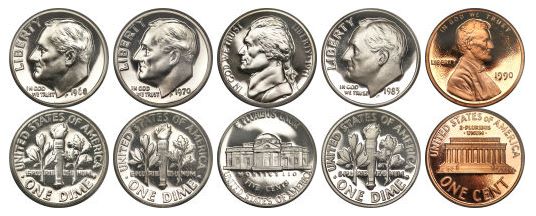When you are learning about coin collecting, there are a number of terms that you will need to be familiar with in order to properly determine the value of your coin when you take it into a Fort Myers coin shop. You will need to know the differences between a circulated coin, an uncirculated coin and a proof coin in particular. Here we will take a look at proof coins and what they actually are.
What They Are
It is important to note that a newly minted proof coin is also classed as an uncirculated coin because it will never have been made available for general public consumption. However, the methods used in making the coin make it different to the average uncirculated variety.
The difference comes in the way that the coin is produced. Coins are made by using a pair of dies to strike a blank piece of metal. The force used in this process is such that an imprint of the die is left on either side of the metal, creating the front and back, or heads and tails, of the coin that we are already familiar with.
With a proof coin, this process is more defined and intense. Instead of simply being struck with the die once, the metal used for a proof coin will have been struck at least twice, using specially treated dies. By doing this, the metal that is being stamped is forced into every single crevice of the die, which creates a more defined look that makes the coin really stand out when compared to similar coins, whether they were circulated or not. This creates a level of fine detail that is often desirable to collectors, which has made proof coins something of a rare and valuable commodity.
Cost And Rarity
Due to the extra work and effort that goes into the creation of a proof coin, you will usually find that they are more valuable than their equivalents that have not undergone the same process. There is a separate grading process that is used to determine the quality of the coin, known as the PR scale, with coins that are lower on the scale generally being ones that show a little more wear and tear.
The more extensive work, coupled with the fact that proof coins are often made in very limited amounts, will usually mean that a proof coin is sold at a higher value than a regular coin of the same date. However, it is important to note that this is not always the case so it is still worth seeking the advice of a professional coin dealer if you have a proof coin.
